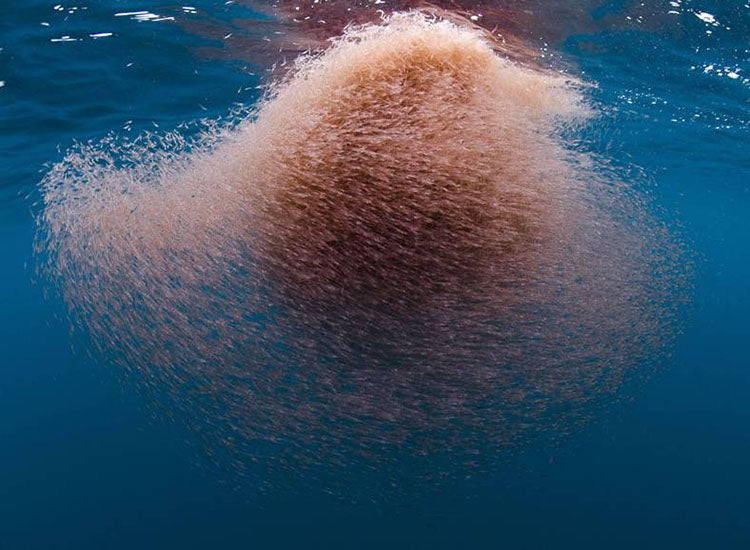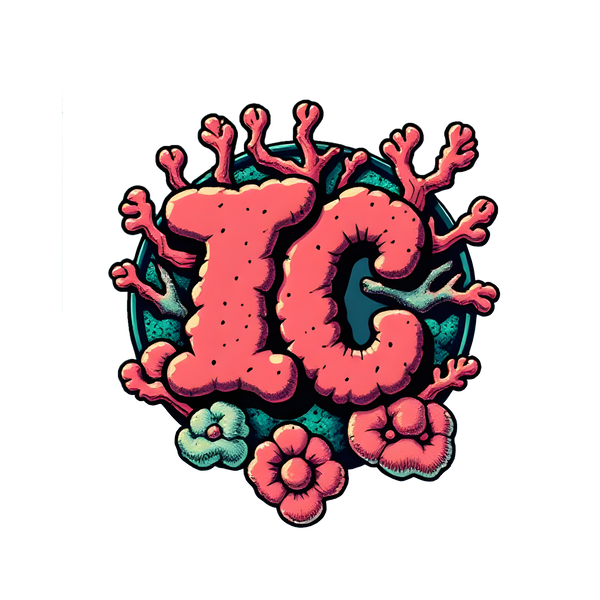
Krill Collapse: When Tiny Goes Titanic
🦐 Small But Mighty
Antarctic krill may look like shrimp, but they move oceans. Literally. These thumbnail-sized crustaceans form the largest biomass of any animal on Earth and feed nearly everything down south—from penguins and seals to whales the size of buses. But krill don’t just fuel the food chain; they help cool the planet. Every day, they dive deep into the sea, carrying carbon with them in a vertical migration that sequesters CO₂ like a natural engine.
So when the krill fishery shut down early this year after hitting a record-breaking 620,000 metric tons caught, alarms went off in the conservation world. This wasn't a controlled slowdown—it was a panicked “hit the brakes” moment. We just fished the foundation of the ocean like there was no tomorrow.

The image above captures a glowing swarm of krill, illuminated by filtered light in the depths of cold ocean waters—an ethereal glimpse of the powerhouse organisms that sustain Southern Ocean ecosystems.
🚨 Feeding Frenzy
The cause? A rising tide of global demand. Krill are harvested for omega‑3 supplements, animal feed, and even cosmetics. Ships now sweep across the Southern Ocean in industrial-scale fleets, sometimes operating in sensitive whale feeding zones. According to CCAMLR (the organization tasked with regulating Antarctic fisheries), this year’s limit was reached faster than ever.

The image above shows a three-dimensional sonar model of a giant krill swarm—400 m long, 200 m wide, and 100 m deep. It illustrates how these tiny creatures form “super-organisms” capable of supporting entire Southern Ocean ecosystems.
It’s not just about the numbers—it’s about who’s left behind. Seals, penguins, and whales rely on dense krill swarms to survive. With those swarms disappearing, entire populations are at risk. In areas near major fishing zones, penguin chicks are being abandoned. Whales are traveling farther to find food.
“Antarctic krill are worth more to nature and people left in the ocean than removed.”
— Emily Grilly, WWF
🌎 The Ocean’s Unsung Climate Hero
If we removed all krill from the sea, we wouldn’t just lose species. We’d lose one of Earth’s most powerful carbon sinks. Every night, krill descend hundreds of meters into the ocean, taking with them the carbon they consumed during the day. This “lipid pump” stores millions of tons of carbon—more than most countries offset with renewables.
And yet we vacuum them up by the ton for fish oil pills.
-
Without krill:
-
Whales and penguins starve.
-
The Southern Ocean loses its balance.
-
Earth's natural carbon pump stalls.
-
We don’t need a machine. We had one. And now it’s endangered because of corporate greed and passive governance.
❌ “Sustainable” Isn’t Always Safe
Many companies claim to harvest krill sustainably, but video evidence tells a different story. Footage has emerged of krill trawlers operating dangerously close to whale pods, and whales caught in bycatch nets. The label “sustainable” too often masks the truth: that large-scale extraction in ecologically vital zones is never truly sustainable.
And yet, efforts to expand marine sanctuaries in the Antarctic have stalled for years—largely due to opposition from fishing nations like Russia and China. Even as scientists raise the alarm, politics plays its tired tune.

The image above shows a krill supertrawler cutting through Antarctic waters—an industrial operation that sometimes drags nets through feeding whale pods, highlighting the direct competition between humans and marine giants.
The sad truth? We’ve built an ocean economy that values short-term profits over long-term life.
🌊 Wear Your Protest, Spark a Rebellion
At Immoral Coral, we believe silence is complicity. That’s why we create shirts that shout for the species that can’t. Every tee, tank, and hoodie is a wearable protest. A reminder that you care, that you’re loud, and that you’re not going down without a splash.
“If we let one tiny species vanish, we’ve already lost the war.”
— Immoral Coral
So whether you're scrolling late at night or reading this with your coffee, take this as your rally cry. The krill may be small, but their story is massive. And now it’s yours to tell.
